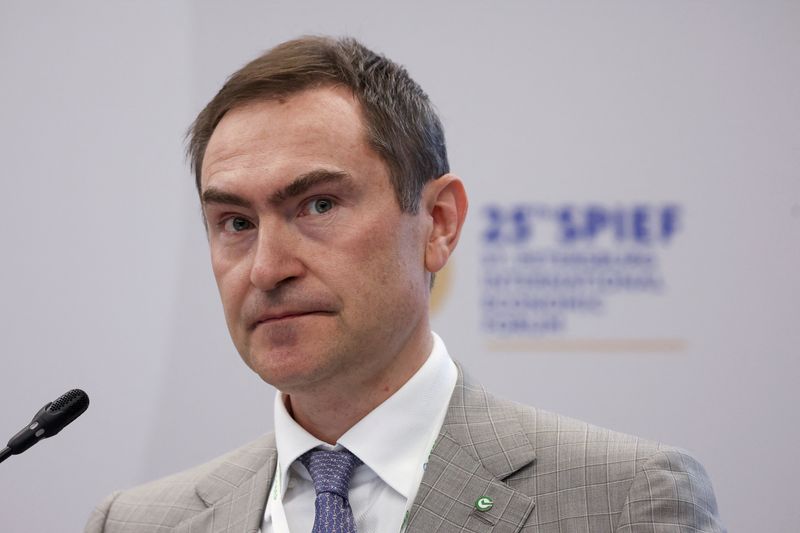By Gleb Bryanski and Elena Fabrichnaya
MOSCOW (Reuters) -Russia has the potential to improve its position in global AI ratings by 2030 despite Western sanctions thanks to talented developers and its own generative AI models, the first deputy CEO of Russia's largest lender, Sberbank, told Reuters.
Some AI developers left Russia in recent years, especially fleeing a mobilisation drive for the Ukraine conflict in 2022, but Alexander Vedyakhin said people were returning home, lured by the new opportunities, and he said it was vital to keep encouraging experimentation in the sector.
Russia lags the United States and China, the world's leading AI pioneers, by six to nine months on a range of parameters but that could quickly change, he said.
"I am confident that Russia can significantly improve its current positions in international rankings by 2030 through its own developments and supportive regulation in the field of generative AI," said Vedyakhin, whose bank is spearheading AI development in Russia.
"(Western) sanctions were aimed at limiting Russia's computing power, but we are trying to compensate for the shortage with our talented scientists and engineers," he said in the interview, authorised for publication on Thursday.
Russia currently ranks 31st of 83 countries for AI implementation, innovation and investment on UK-based Tortoise Media's Global AI Index, well behind not only the United States and China but also fellow BRICS members India and Brazil.
Speaking on Wednesday at Sberbank's annual AI Journey conference, President Vladimir Putin said Russia would develop AI with its BRICS partners and other countries, in a bid to challenge U.S. dominance in one of the most promising technologies of the 21st century.
Vedyakhin said Russia would not compete with the U.S. and China in building giant data centres, but would focus on developing smart AI models similar to Meta (NASDAQ:META)'s Large Language Model Meta AI, known as Llama.
Large language models (LLM) mine vast amounts of text in order to summarise information and generate content. They can answer questions, for instance, with sentences that can read as though written by humans.
'HERRING UNDER A FUR COAT'
Vedyakhin said Russian language generative AI models would guarantee the country's technological sovereignty.
"I believe that any country that sees itself as independent on the world stage should have its own large language model," Vedyakhin said. Russia is among 10 countries, which are developing their own national generative AI models.
Vedyakhin pointed out the weaknesses of English language-trained models in national markets, where they often do not understand the local context.
For example, he said that when prompted to draw a picture of a popular Russian dish, commonly called 'herring under a fur coat', a typical Western LLM would draw a fish wearing a fur coat, not the dish.
Vedyakhin said China and especially Europe were losing their advantage in AI due to excessive regulation, adding he hoped Russia would maintain AI-supportive regulation in the future.
"If we deprive our scientists and major corporations of the right to experiment now, it will halt the development of technology. As soon as bans appear, we may start losing the race in artificial intelligence," Vedyakhin said.
"Here, people are not punished for experimenting. If some mistakes occur, it is not something terrible with serious consequences. The longer we maintain this, the more chances Russia has to be among AI technology leaders," he said.
Despite an overall fall in venture capital investment in Russia, investment in AI startups has kept growing, Vedyakhin said, signalling future fragmentation of a market currently dominated by Sberbank and technology firm Yandex (NASDAQ:NBIS).

Vedyakhin said the emergence of decentralised autonomous organisations (DAO) - where AI workers communicate with the help of blockchain technology - could help Russia tackle its labour shortage.
"In such a DAO, there can be only one human, a CEO or owner, and everything else is done by AI agents," he said, predicting that DAO could be in widespread use in Russia in 3-5 years.